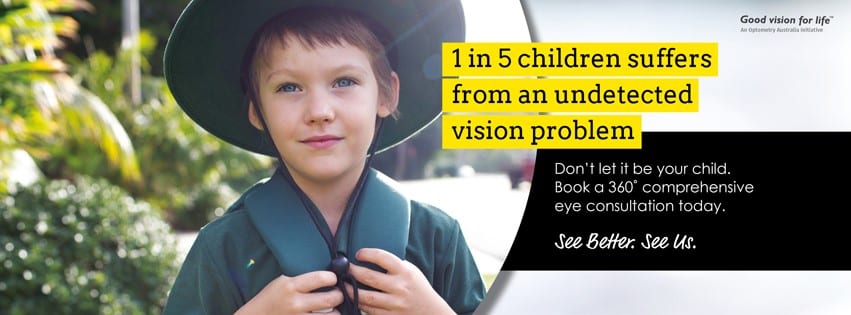Did you know that 80% of your child’s learning comes through their vision?
This is why it is so important to make sure that we as parents check our child’s vision is working as effectively as it can.
Most parents think their child’s vision is normal. Your son or daughter can see far better than yourself when looking at road signs or even reading fine print. However, this does not mean all is normal. Louella Varney, the owner and Behavioural Optometrist at Vision Potential says “Vision is more than just seeing the bottom line of the chart or comparing how far your child can see compared to you in the distance. Most children when they come for an eye examination can see the bottom line of the chart but what is concerning is they still may have a vision problem”.
What should an Optometrist be testing for?
Louella says “To make sure your child has good and efficient vision for school work, you should be asking your optometrist if they test for the following”:
- Eye teaming
- Accommodation and focus
- Eye Movements and tracking
- Muscle stamina
- Visual Processing
- Ocular health
- Sight and the usual testing for longsighted, short-sighted or astigmatism
All the above aspects of vision are very important for good and prolonged concentration for learning at school.

What are the symptoms of a potential Vision Problem?
An undiagnosed vision problem can affect your child in many ways including giving them:
- Headaches, tired and sore eyes
- Blurry vision for reading and distance
- Problems copying from the board in class
- Tracking issues meaning skipping words and lines when reading
- Drop off in school performance
- Drop off in comprehension or poor comprehension
- Behavioural issues
- Self-esteem issues
- Falling behind at school
- Thinking they are stupid
- Mistaking words with similar beginning or endings
- Letter and word reversals
The good news is these visual issues are treatable if diagnosed. Louella Varney says “We see lots of children that have issues with eye tracking, focus and accommodation issues, low muscle stamina, visual processing and eye teaming issues. At Vision Potential, not only do we complete a thorough eye test, but we also focus on the improvement of these areas via vision therapy and glasses, so your child can learn and concentrate and enjoy school.
How often should your child be tested?
All school aged children should be having a behavioural eye examination yearly, even if they are doing well at school. Otherwise an undiagnosed vision problem could hamper them in the future as the print becomes smaller or the workload increases. Don’t make the mistake of thinking your child is okay with their vision. This could be affecting your child’s learning and progress right now! Louella Varney says “Now is a good time to have your child’s eyes assessed by an optometrist before school begins or early in the first term to determine if they are visually ready for the school year.
Visit Vision Potential for more information or to get in contact with Louella Varney.
This article was published in Issue 20 of our print magazine, February/March 2017.

